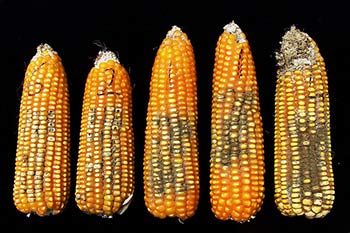The National Cereals and Produce Board has installed and commissioned five additional aflatoxin testing laboratories at their facilities in Meru, Eldoret, Machakos, Kitale and Nakuru. This brings to six the number of aflatoxin testing laboratories in its network.Initially there was only one laboratory in Nairobi.
NCPB says the equipment installed uses the Elisa Test method and can test all mycotoxins that exist in grain and other foods. These testing facilities are aimed at providing testing services to value chain actors who include farmers, traders, millers, among other stakeholders along the grains and pulses value chain so that they can ascertain and be assured of the quality of the grains they handle.
NCPB Managing Director, Mr Joseph Kimote also awarded certificates to NCPB staff who have been trained on aflatoxin testing. The trained staff will run the laboratories.
“Having experienced firsthand the ramifications of procuring aflatoxin maize, in terms destruction of food and loss of funds, we want to prevent a recurrence of these incidences and ensure that the Kenyan consumer has access to clean and safe food for consumption”. Mr. Kimote said. The general public and all stakeholder including millers, grain processors, trader, institutions and farmers can use these services which will be charged at a fee of Kshs. 1,740 (VAT inclusive) per sample.
Also present at the event was Mr Peter Mutuku, the Managing Director of Sorela Suppliers (Ltd), the company that was contracted by NCPB to install the laboratory testing kits and also train the Quality Control Officers, who will man the laboratories.
Aflatoxin is a poison produced by aspergillus flavus, a fungus that resides in the soil and infects crops while in the field. However, contamination can increase during post-harvest activities such as processing, transport and storage. Various foods susceptible to contamination with aflatoxins include cereals, oil seeds, pulses, root crops, vegetable products and beverages.



